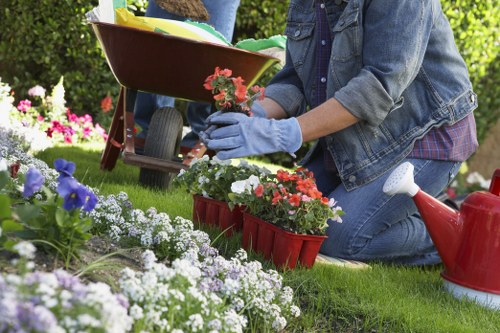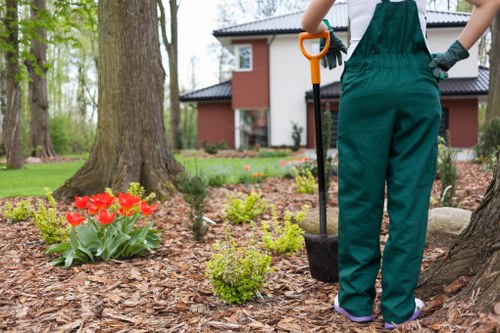Comprehensive Guide to Garden Fence Replacement Hooks

Maintaining a beautiful and functional garden often involves ensuring that every component, including the fence, is in optimal condition. One crucial element in garden fencing is the replacement hook. Whether you're dealing with wear and tear or looking to upgrade your garden's aesthetic, understanding garden fence replacement hooks is essential.
In this guide, we'll explore everything you need to know about garden fence replacement hooks, from their types and installation to maintenance and the best places to purchase them. By the end of this article, you'll be equipped with the knowledge to make informed decisions for your garden fencing needs.
Let's delve into the world of garden fence replacement hooks and discover how they can enhance the longevity and appearance of your garden fence.

What Are Garden Fence Replacement Hooks?
Garden fence replacement hooks are essential hardware components used to secure and stabilize various types of garden fences. They come in different shapes, sizes, and materials, each designed to serve specific purposes in maintaining fence integrity.
These hooks are typically made from durable materials like stainless steel, galvanized steel, or wrought iron to withstand outdoor conditions. They play a pivotal role in attaching fence panels, gates, and other components, ensuring that your garden fence remains sturdy and reliable.
Understanding the different types of replacement hooks available can help you choose the right one for your specific fencing needs.

Types of Garden Fence Replacement Hooks
1. **Standard Hook**
Standard hooks are versatile and commonly used in various fencing applications. They are ideal for attaching fence panels to posts, providing a secure connection that can withstand regular wear and tear.
2. **Gate Hook**
Gate hooks are specifically designed for securing garden gates. They often feature a more robust construction to handle the additional stress and movement associated with gates.
3. **Loop Hook**
Loop hooks offer a decorative touch while serving a functional purpose. They are perfect for gardens where aesthetic appeal is just as important as functionality.
4. **Adjustable Hook**
Adjustable hooks provide flexibility in installation, allowing for adjustments in height or positioning. This is particularly useful in gardens with uneven terrain or when precise alignment is required.
5. **Decorative Hook**
For those looking to enhance the visual appeal of their garden fence, decorative hooks come in various designs and finishes. They offer both functionality and style, making them a popular choice for ornamental gardens.

Choosing the Right Replacement Hook
Selecting the appropriate garden fence replacement hook involves considering several factors to ensure compatibility and durability.
Material
The material of the hook is crucial for longevity. Stainless steel and galvanized steel are excellent choices for resisting rust and corrosion, especially in areas with high moisture or rainy climates.
Size and Strength
Ensure the hook is the right size and strength for your fence. Heavier fences may require more robust hooks to provide adequate support.
Design and Aesthetics
Consider the overall design of your garden. Decorative hooks can complement the garden's aesthetic, while standard hooks are more utilitarian.
Ease of Installation
Some hooks come with features that make installation easier, such as pre-drilled holes or adjustable components. Assess your DIY skills and choose hooks that match your installation comfort level.
Cost
Balance quality with budget. While higher-quality hooks may cost more initially, they often provide better durability and longevity, saving money in the long run.

Installation of Garden Fence Replacement Hooks
Proper installation is key to ensuring that your replacement hooks function effectively and last for years. Here’s a step-by-step guide to installing garden fence replacement hooks:
Tools and Materials Needed
- Replacement hooks
- Screwdriver or drill
- Screws or nails
- Measuring tape
- Level
- Pencil
Step-by-Step Installation
- Measure and Mark: Determine the exact spot where the hook will be installed. Use a measuring tape and pencil to mark the position.
- Pre-drill Holes: If necessary, pre-drill holes to prevent the wood from splitting, especially when working with wooden posts or panels.
- Attach the Hook: Secure the hook to the marked spot using screws or nails. Ensure it is firmly attached and can support the weight and stress of the fence or gate.
- Check Alignment: Use a level to ensure the hook is straight and properly aligned with the adjoining fence or gate.
- Secure the Fence: Attach the fence panel or gate to the hook, ensuring a snug and secure fit.
- Test Stability: Gently test the fence or gate to ensure the hook holds securely and there is no wobbling or instability.

Maintenance Tips for Replacement Hooks
To extend the life of your garden fence replacement hooks, regular maintenance is essential. Here are some tips to keep your hooks in top condition:
Regular Inspection
Periodically check your hooks for signs of wear, rust, or damage. Early detection can prevent minor issues from escalating.
Cleaning
Keep the hooks clean from dirt, debris, and moisture. Use a damp cloth to wipe them down and ensure they are free from obstructions.
Rust Prevention
Apply rust-resistant coatings or paints to metal hooks to protect them from corrosion, especially in humid or rainy environments.
Tightening Screws and Nails
Over time, screws and nails may loosen. Regularly check and tighten them to maintain the hooks' stability and functionality.
Lubrication
If your hooks have moving parts, apply a suitable lubricant to keep them operating smoothly and prevent rust buildup.

Benefits of Using High-Quality Replacement Hooks
Investing in high-quality garden fence replacement hooks offers numerous advantages that contribute to the overall health and appearance of your garden fence.
- Durability: High-quality hooks are built to last, resisting rust and corrosion for extended periods.
- Enhanced Stability: Superior hooks provide better support, preventing sagging or misalignment of fence panels and gates.
- Aesthetic Appeal: Well-designed hooks can complement your garden's look, adding a touch of elegance or charm.
- Ease of Installation: Premium hooks often come with user-friendly features that simplify the installation process.
- Cost-Effective: Though initially more expensive, high-quality hooks reduce the need for frequent replacements, saving money over time.

Where to Buy Garden Fence Replacement Hooks
Finding the right place to purchase garden fence replacement hooks is crucial for ensuring quality and variety. Here are some top options:
Local Hardware Stores
Local hardware stores often carry a wide range of fencing supplies, including replacement hooks. Shopping locally allows you to see the products firsthand and get personalized advice from knowledgeable staff.
Home Improvement Centers
Big-box home improvement centers like Home Depot or Lowe's offer extensive selections of fence hardware. These stores provide various brands and types, catering to different budgets and styles.
Online Retailers
Websites like Amazon, eBay, and specialized fencing supply stores offer convenience and a broader selection. Online shopping allows you to compare prices, read reviews, and choose from a vast array of options without leaving your home.
Specialty Fencing Suppliers
For specific or high-quality hooks, specialty fencing suppliers provide expert products tailored to particular fencing needs. These suppliers often offer professional-grade hooks and personalized service.
Garden Centers
Garden centers not only offer plants and garden tools but also a variety of fencing supplies. They can be a good source for aesthetically pleasing and durable replacement hooks.

Local Relevance: Garden Fence Replacement Hooks in Nearby Areas
When it comes to garden fence replacement hooks, understanding the unique needs of different areas around Hook can make a significant difference. Here are 10 nearby areas and their specific requirements:
- Villiers: Known for its lush gardens, Villiers residents prefer decorative hooks that blend seamlessly with ornamental fences.
- Broxbourne: With a mix of modern and traditional homes, Broxbourne requires versatile hooks that cater to various fence styles.
- Cheshunt: Cheshunt's windy climate necessitates sturdy, durable hooks that can withstand strong gusts without loosening.
- Sash Green: Sash Green gardens often feature climbing plants, so corrosion-resistant hooks are essential to prevent rust.
- Waltham Cross: The diverse architecture in Waltham Cross calls for a range of hook designs, from minimalist to ornate.
- Enfield Enfield's proximity to parks means hooks should support eco-friendly fences made from sustainable materials.
- Waltham Abbey: Historic homes in Waltham Abbey benefit from traditional-style hooks that preserve the garden's classic look.
- Ware: Ware's expansive gardens require hooks that can support larger fence panels and heavy gates.
- Stevenage: Stevenage's urban gardens need compact and efficient hooks suitable for smaller fencing spaces.
- Edmonton With a focus on security, Edmonton residents prefer hooks that enhance the strength and reliability of their fences.

Common Challenges and Solutions
Replacing garden fence hooks can come with its set of challenges. Here are some common issues and how to address them:
Rust and Corrosion
Rust can compromise the strength of your hooks. To prevent this, choose hooks made from stainless steel or galvanized materials and apply rust-resistant coatings.
Improper Installation
Incorrect installation can lead to unstable fences. Follow the manufacturer’s instructions carefully and use the right tools and hardware for a secure fit.
Incompatibility with Existing Fencing
Not all hooks fit every type of fence. Measure your current fencing components and ensure the replacement hooks are compatible in size and design.
Weather Damage
Extreme weather conditions can damage hooks. Opt for weather-resistant materials and perform regular maintenance to mitigate damage.
Wear and Tear
Frequent use can cause hooks to wear out. Invest in high-quality hooks and replace them as needed to maintain fence integrity.

Benefits of Professional Installation
While DIY installation is possible, hiring a professional offers several advantages:
- Expertise: Professionals have the experience to handle various fencing issues and ensure hooks are installed correctly.
- Time-Saving: Skilled installers can complete the job faster, allowing you to focus on other tasks.
- Quality Assurance: Professionals use high-quality tools and materials, ensuring a long-lasting installation.
- Safety: Proper installation reduces the risk of accidents or injuries associated with faulty fencing.

Environmental Considerations
Choosing eco-friendly fencing solutions is increasingly important. Here’s how garden fence replacement hooks can be part of an environmentally conscious garden:
Sustainable Materials
Opt for hooks made from recycled or sustainable materials. This reduces the environmental impact and promotes resource conservation.
Durability
Long-lasting hooks mean fewer replacements, which decreases waste and conserves materials over time.
Local Sourcing
Purchasing hooks from local suppliers reduces transportation emissions and supports the local economy.
Eco-Friendly Finishes
Choose hooks with non-toxic, environmentally friendly finishes to minimize harmful runoff into the soil and water.

Innovations in Garden Fence Hooks
The fencing industry continually evolves with new technologies and designs. Here are some recent innovations in garden fence hooks:
- Smart Hooks: Equipped with sensors, smart hooks can monitor fence stability and notify you of any issues via a mobile app.
- Adjustable Designs: New adjustable hooks allow for easy height and position changes without the need for specialized tools.
- Integrated Locking Mechanisms: Enhanced security features prevent unauthorized access and provide extra stability for gates.
- Decorative Enhancements: Modern hooks come with customizable finishes and designs, allowing homeowners to match their garden's aesthetic perfectly.
- Corrosion-Resistant Coatings: Advanced coatings extend the lifespan of hooks, making them more resilient to harsh weather conditions.

Cost Considerations
Budgeting for garden fence replacement hooks involves balancing quality with affordability. Here are some factors to consider:
Initial Cost
Higher-quality hooks may have a higher upfront cost but offer better durability and performance.
Long-Term Savings
Investing in durable hooks reduces the frequency of replacements, saving money over time.
Installation Costs
If opting for professional installation, factor in the labor costs associated with the service.
Material Choice
The material of the hook affects the price. Stainless steel and wrought iron hooks are generally more expensive than basic galvanized options.
Quantity Needed
Determine how many hooks you need based on the size of your fence. Bulk purchasing can sometimes offer cost savings.

Conclusion
Garden fence replacement hooks play a vital role in maintaining the functionality and aesthetics of your garden fence. By selecting the right type of hook, ensuring proper installation, and performing regular maintenance, you can enhance the longevity and appearance of your garden. Whether you choose to handle the installation yourself or hire a professional, investing in quality hooks will provide long-term benefits for your garden's structure and beauty.
Remember to consider factors such as material, design, and local climate when selecting replacement hooks. Additionally, supporting local suppliers and opting for eco-friendly options can contribute to a more sustainable and attractive garden environment.
With the knowledge and tips provided in this guide, you're well-equipped to make informed decisions and keep your garden fence in top shape for years to come.
Frequently Asked Questions
1. How do I choose the right size of garden fence replacement hook?
Consider the weight and type of your fence, the material of the hook, and the specific application. It's essential to match the hook size and strength to the fence's requirements to ensure proper support and stability.
2. Can I install garden fence replacement hooks myself, or should I hire a professional?
If you have basic DIY skills and the necessary tools, you can install the hooks yourself. However, hiring a professional ensures precise installation and can save time, especially for larger or more complex fencing projects.
3. What materials are best for garden fence replacement hooks in a humid climate?
In humid climates, opt for corrosion-resistant materials such as stainless steel, galvanized steel, or wrought iron. These materials are better suited to withstand moisture and prevent rust and corrosion.
4. How often should I inspect and maintain my garden fence hooks?
It's recommended to inspect your garden fence hooks at least twice a year, typically in the spring and fall. Regular maintenance helps identify and address any issues early, ensuring the longevity of your fence.
5. Where can I find eco-friendly garden fence replacement hooks?
Eco-friendly hooks are available at specialty fencing suppliers, eco-conscious home improvement stores, and online retailers that focus on sustainable products. Look for hooks made from recycled materials or those with environmentally friendly coatings.